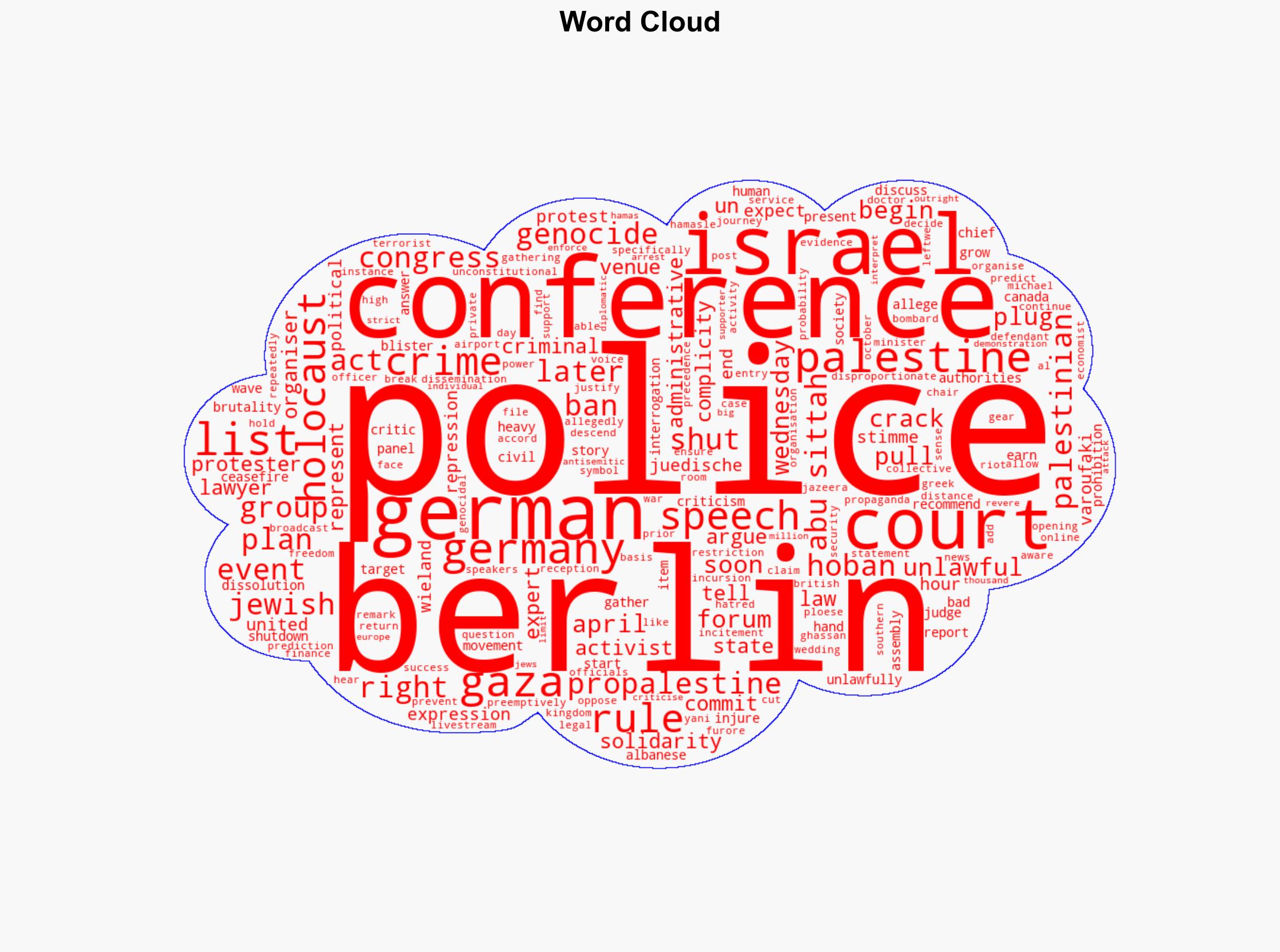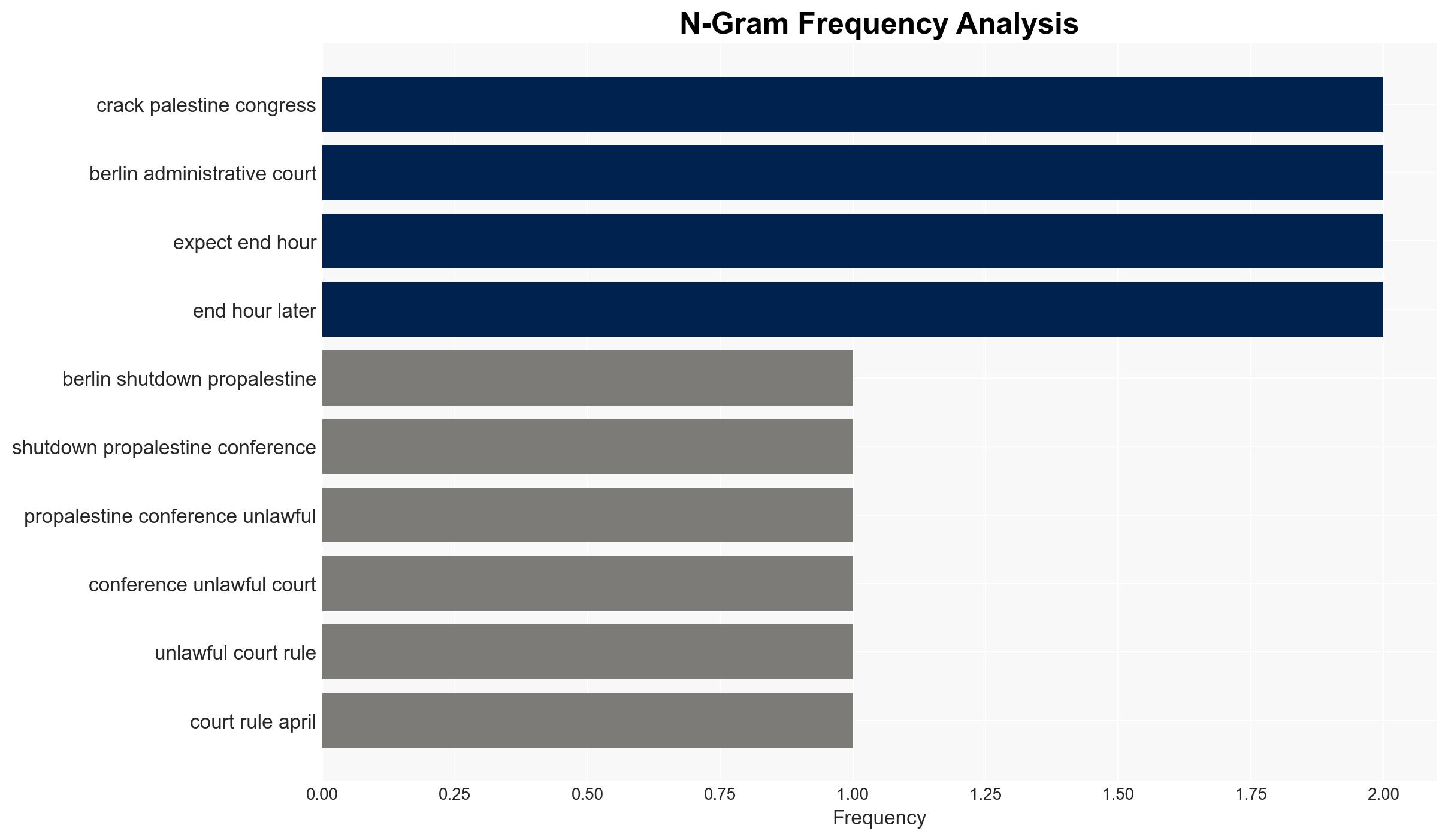Berlin Court Rules Shutdown of Pro-Palestine Conference by Authorities Was Unlawful
Published on: 2025-11-26
AI-powered OSINT brief from verified open sources. Automated NLP signal extraction with human verification. See our Methodology and Why WorldWideWatchers.
Intelligence Report:
1. BLUF (Bottom Line Up Front)
The Berlin court’s ruling against the police shutdown of a pro-Palestine conference highlights tensions between freedom of expression and national security concerns in Germany. The most supported hypothesis is that the shutdown was primarily motivated by a desire to preemptively mitigate potential unrest, rather than concrete evidence of criminal activity. Confidence level: Moderate. Recommended action: Engage in diplomatic dialogue to address concerns about freedom of expression while ensuring security protocols are clear and justified.
2. Competing Hypotheses
Hypothesis 1: The Berlin authorities acted primarily out of a genuine concern for public safety and potential criminal activity, based on intelligence suggesting possible incitement or violence at the conference.
Hypothesis 2: The shutdown was motivated by political pressure and a desire to align with broader diplomatic stances, particularly Germany’s relationship with Israel, rather than specific security threats.
Hypothesis 2 is more likely given the lack of concrete evidence of criminal activity presented by the police and the court’s ruling that the action was disproportionate. The political context, including Germany’s historical sensitivity regarding Israel, supports this interpretation.
3. Key Assumptions and Red Flags
Assumptions: The assumption that police intelligence was accurate and actionable; that the conference posed a genuine threat to public order.
Red Flags: The absence of evidence of criminal activity; the timing of the shutdown; the potential influence of diplomatic relations on domestic policy decisions.
Deception Indicators: Possible exaggeration of threats to justify preemptive action; lack of transparency in police decision-making processes.
4. Implications and Strategic Risks
The ruling could embolden civil society groups to challenge future restrictions, potentially leading to increased public demonstrations. There is a risk of escalating tensions between pro-Palestine activists and authorities, which could result in political and social unrest. Internationally, Germany may face criticism for perceived suppression of free speech, impacting its diplomatic relations.
5. Recommendations and Outlook
- Engage in dialogue with civil society groups to address concerns about freedom of expression while ensuring public safety.
- Review and clarify security protocols to ensure actions are evidence-based and proportionate.
- Best Scenario: Improved understanding and cooperation between authorities and activists, reducing tensions.
- Worst Scenario: Escalation of protests and international criticism, straining diplomatic relations.
- Most-likely Scenario: Continued legal and public challenges to police actions, with potential for isolated incidents of unrest.
6. Key Individuals and Entities
Michael Ploese (lawyer for conference organizers), Wieland Hoban (Chair, Jüdische Stimme), Ghassan Abu Sittah (speaker), Yanis Varoufakis (economist, former Greek Minister of Finance).
7. Thematic Tags
Structured Analytic Techniques Applied
- Cognitive Bias Stress Test: Expose and correct potential biases in assessments through red-teaming and structured challenge.
- Bayesian Scenario Modeling: Use probabilistic forecasting for conflict trajectories or escalation likelihood.
- Network Influence Mapping: Map relationships between state and non-state actors for impact estimation.
Explore more:
National Security Threats Briefs ·
Daily Summary ·
Support us





